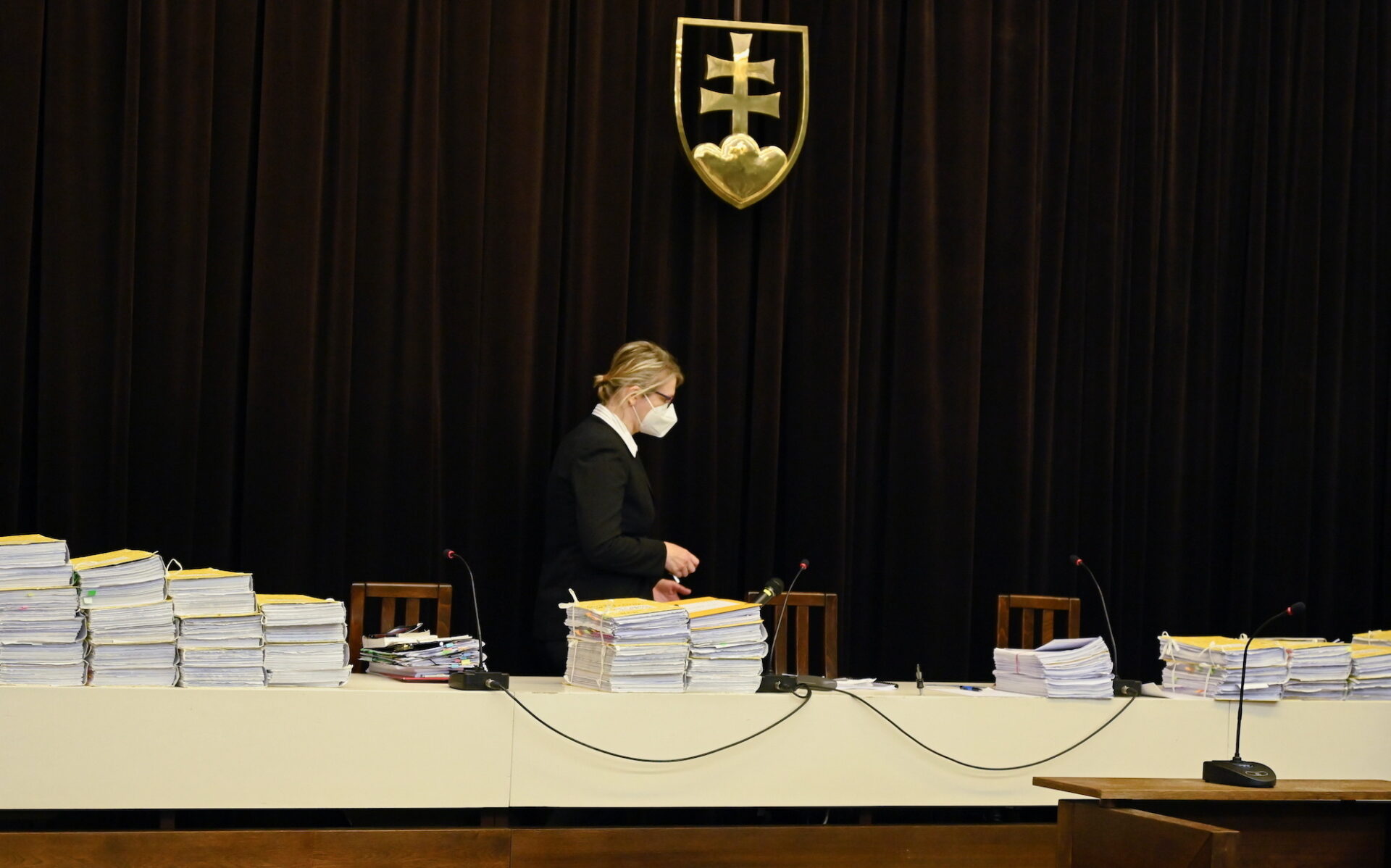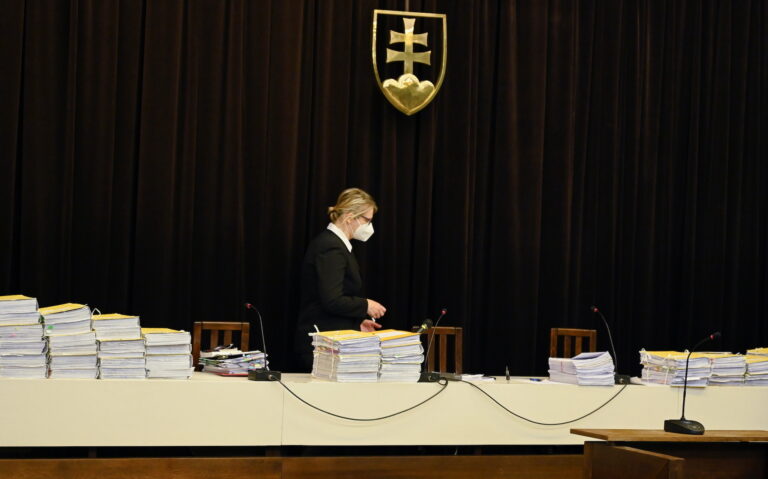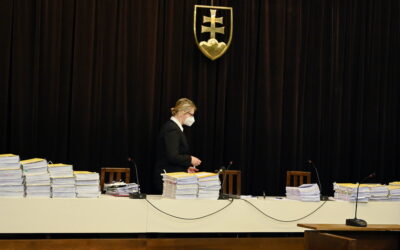The Supreme Court of the Slovak Republic has overturned Marian Kočner’s and Alena Zsuzsová’s acquittals in the murders of Ján Kuciak and Martina Kušnírová on June 15, 2021. The case will be retried by the Specialized Criminal Court in Pezinok by the same panel of judges. The guilty verdict issued to the murderer’s driver, Tomáš Szabó, was upheld, and he is now serving 25 years for being an accomplice in Ján’s and Martina’s killings as well as for the murder of businessman Peter Molnár, a crime he committed with Miroslav Marček. Alena Zsuzsová was not present in the Supreme Court.
“This is the first shot in the dark for justice in Slovakia,” said victim Martina Kušnírová’s mother, Zlata Kušnírová, summing up her feelings about the appeal court’s decision.
“The Supreme Court of the Slovak Republic, has, on the basis of an appeal, reviewed the verdicts issued by the Specialized Criminal Court and its actions,” wrote Peter Paluda, the head judge, in his opinion. After studying the case files (read our analysis of the evidence) and after the proceedings the three-judge panel, which also includes Ivetta Macejková and Dana Wänkeová, decided to overturn nearly all the verdicts issued by the lower court. Paluda confirmed for Aktuality.sk that the decision was unanimous.
Kočner and Zsuzsová will now be retried by a panel led by Judge Ružena Sabová of the Specialized Criminal Court, which the Supreme Court has ordered to consider new evidence. A precise list of this new evidence will be included in the written decision issued by the Supreme Court, although Paluda has already mentioned some specifics.
It will include messages sent by Kočner via Whatsapp and Viber, which, according to the prosecutor and Zlata Kušnírová, prove that Kočner had violent intentions. Central here are messages to Jaroslav Haščák, in which Kočner wrote that he was working on “getting rid of a dick”, and to Miroslav Konôpka, to whom Kočner wrote that “he will get the shit beaten out of him”.
Kočner and Zsuzsová to stand trial once again
“The Supreme Court of the Slovak Republic has reviewed the acquittals and decided that the Specialized Criminal Court made its judgement prematurely,” explained Paluda. He put the mistakes made by Sabová’s panel into five categories: it did not consider all the circumstances important for making a decision; it did not adequately justify its decision; not all important evidence was presented; the evidence that was presented was not examined correctly, that is, in the context of other evidence, and finally, it examined evidence that had not been presented during the proceedings.
According to Paluda, the acquittal verdicts issued by the Specialized Criminal Court “lacked internal logic”. The Supreme Court found that the verdicts issued by Ružena Sabová’s panel contain general formulations about the presumption of innocence instead of a chronological analysis of events of the type found in Tomáš Szabó’s guilty verdict. If it had, the Supreme Court claims it would have certainly not concluded that Kočner and Zsuzsová were innocent, noting that the evidence needs to be evaluated in context, not isolated. The panel, in its oral judgement, indicated that such evidence includes messages between Kočner and Zsuzsová sent using the Threema application.
According to the Supreme Court, the content of these communications “was evaluated in a way that is at odds with the criminal code. The lower court ripped part of this communication out of context or did not evaluate it in the context of other evidence to which this communication referred.”
After the proceedings Paluda also told journalists that these messages, besides their grammatical meaning that the lower court considered, “need some other deciphering, but it is too premature to assess them; that’s a matter for the experts”, referring to the expert opinion produced by linguists from Comenius University in Bratislava, which the prosecutor has proposed as new evidence.
According to Paluda, statements made by Zoltán Andruskó must be evaluated in the context of other evidence. The lower court believed his testimony incriminating Tomáš Szabó but not his statements against Kočner and Zsuzsová. The lower court also considered him less credible because for his testimony he was handed a lower sentence and was thus a crown witness.
“I personally believe that if the testimony of a witness, even one that is not entirely credible, can be correlated and compared with other objective evidence, and this evidence tells me that this witness is telling the truth, I cannot imagine how I could consider him to be not credible,” said Paluda, explaining his viewpoint.
In terms of evidence that the Specialized Criminal Court referred to but was not taken into account, the Supreme Court explicitly mentioned petition forms that had been found in a Kia Rio car. They were handed over to investigators by witness Peter Tóth.
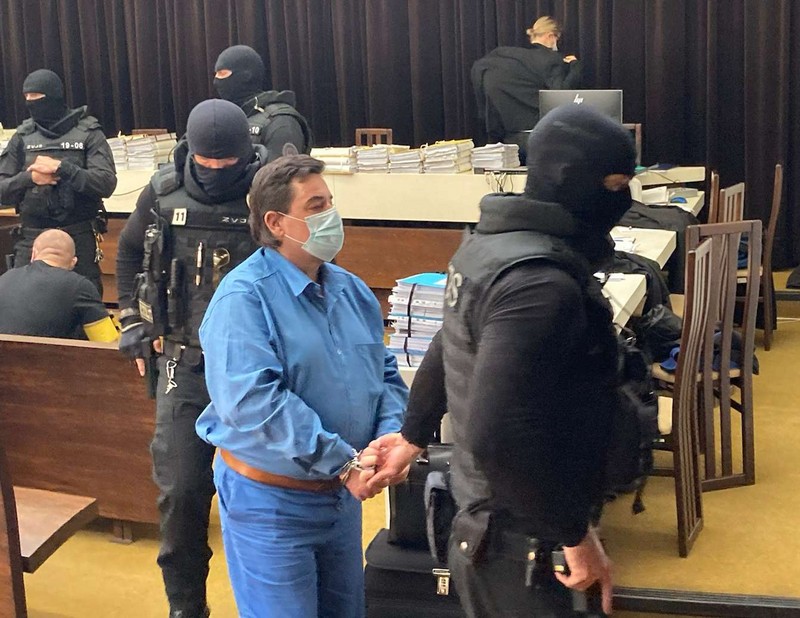
Marian Kočner is being taken away from the courtroom. Photo: ICJK / Tomáš Madleňák
According to the lower court’s verdict and according to the defence, these forms were evidence that in February 2018, when the murders occurred, Kočner and Zsuzsová were collecting the signatures needed to establish a new political party, Cieľ (Goal).
The court in Penizok, however, during the main proceedings did not consider these forms as evidence and did not determine when exactly they were signed. According to Paluda, it will be necessary to clarify whether in February 2018 any signatures were indeed collected. Kočner and Zsuzsová claimed that the reason for some of their meetings and messages sent via Threema was to collect signatures. The prosecutor, however, argued that these meetings and messages were related to the murders.
The same panel
Even though the prosecutor requested in the appeal that the case be retried before a different panel of judges, the Supreme Court decided to return the case to the same judges.
In its oral reasoning, the Supreme Court stated that it had not found the “lower court to have been influenced in its actions or any intention or attempt to influence or distort the evidence.”
The Supreme Court panel did not spare criticism though. It agreed with the prosecutor’s claim that the panel led by Ružena Sabová had acted not only in contradiction to established judicial practice about also in contradiction to basic logic.
Nonetheless, the Supreme Court decided to entrust Ružena Sabová, Rastislav Stieranka, and Ivan Matel with retrying the case. “The Specialized Criminal Court, in the original composition of the panel, must demonstrate that it is capable of taking all due evidence into account and make a new decision.”
According to Paluda, the judges of the lower court will receive “a binding order from the court of appeal, where each and every action [that needs to be done] and piece of evidence will be precisely named, precisely specified, and will be under public scrutiny and public pressure for all these pieces of evidence to be taken into account so that they can be considered logically and so that a decision can be made based on them.”
Szabó’s guilty verdict upheld
The Supreme Court even overturned the guilty verdict of Tomáš Szabó, who along with his cousin Miroslav Marček murdered Peter Molnár, a businessman from Kolárovo, and who was the killer’s driver in the murders of Ján Kuciak and Martin Kušnírová.
But the only reason it overturned this verdict was so it could issue a new verdict confirming his guilt.
According to Paluda, the court had “to consider mistakes that were not referred to in the appeals”. Szabó’s verdict contained a simple mistake: the date on which Molnár was killed was given incorrectly. The judges from the Specialized Criminal Court made a typo here.
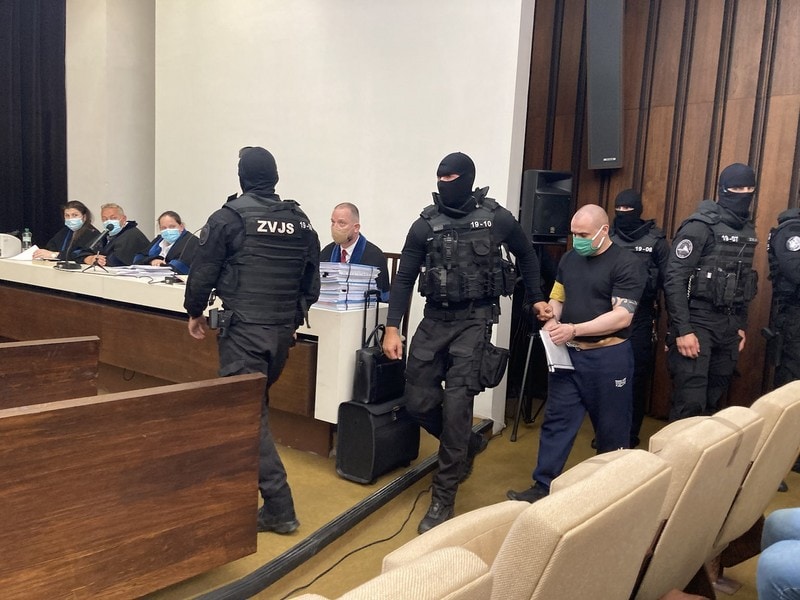
Tomáš Szabó in the court. Photo: ICJK / Tomáš Madleňák
The Supreme Court fixed this error and confirmed Szabó’s sentence of 25 years in a maximum-security prison. Although the prosecutor requested a life sentence in the appeal, the Supreme Court did not change his sentence. According to a representative for the Kuciak family, the court certainly felt that Szabó could eventually be rehabilitated.
Unlike Marian Kočner, Szabó appeared in the courtroom in civilian dress, but for the next several decades he will not be wearing anything else but a prison uniform. After issuing its decision, the Supreme Court ordered Szabó be taken to prison immediately.
Kočner appeared wearing a prison uniform, as he is currently serving time for forging promissory notes in the TV Markíza case. One piece of evidence was considered by the Supreme Court on Tuesday: an extract from the Criminal Register indicating that Kočner had been sentenced to 19 years in prison.
According to the Supreme Court, the sentence Kočner is currently serving is a reason for cancelling the sentence he received for criminal possession of a weapon. During a search of his home, police found ammunition that Kočner possessed illegally. He admitted his guilt and received a 5,000 euro fine. In the meantime, he was sentenced for forgery, and therefore, the Specialized Criminal Court should consider a cumulative punishment.
After this last decision issued by the Supreme Court, whether he will be punished for the murders of Ján Kuciak and Martina Kušnírová is still an open question. Paluda admitted that it is possible that the Specialized Criminal Court might once again find Kočner and Zsuzsová not guilty. It must, however, thoroughly and logically consider all the evidence.
“It must be done properly, and only once it has been done, the evidence taken into account, then can the Specialized Criminal Court decide,” said Paluda.
Kočner’s lawyer, Marek Para, believes that the lower court will find his client not guilty once again because some of the evidence the Supreme Court mentions supports the defence’s arguments, for example, the alleged collection of signatures for establishing a new political party in February 2018. “We suggested this evidence be presented. It benefits my client. We will wait to see the list of evidence that the court will produce. We will argue once again that our client is innocent. Nothing so essential was said today.”
When Ján Kuciak’s father, Jozef Kuciak, was asked whether he trusted the panel of judges that had already once acquitted Kočner and Zsuzsová, he responded, “What other option is there? I trust them. I don’t think I’d be able to handle it if a brand new trial were held. I am satisfied with the decision.”
Cover photo: A court employee arrives for the public hearing of Marian Kocner and Tomas Szabo who are on trial for charges of ordering and carrying out the murders of Jan Kuciak and his fiancee Martina Kusnirova, at the Slovak Supreme Court, in Bratislava, Slovakia, June 15, 2021.Source: RADOVAN STOKLASA/Reuters/Forum
Tomáš Madleňák is a Slovak journalist who has worked for the Investigative Center of Ján Kuciak since 2020. He is based in Bratislava.

